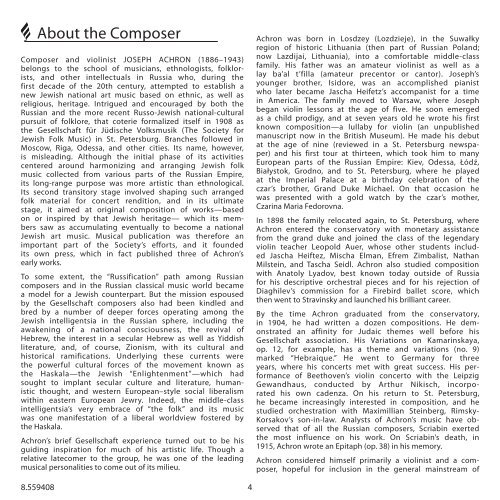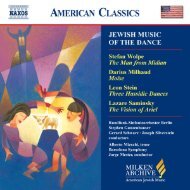Download Liner Notes PDF - Milken Archive of Jewish Music
Download Liner Notes PDF - Milken Archive of Jewish Music
Download Liner Notes PDF - Milken Archive of Jewish Music
- No tags were found...
Create successful ePaper yourself
Turn your PDF publications into a flip-book with our unique Google optimized e-Paper software.
About the ComposerComposer and violinist JOSEPH ACHRON (1886–1943)belongs to the school <strong>of</strong> musicians, ethnologists, folklorists,and other intellectuals in Russia who, during thefirst decade <strong>of</strong> the 20th century, attempted to establish anew <strong>Jewish</strong> national art music based on ethnic, as well asreligious, heritage. Intrigued and encouraged by both theRussian and the more recent Russo-<strong>Jewish</strong> national-culturalpursuit <strong>of</strong> folklore, that coterie formalized itself in 1908 asthe Gesellschaft für Jüdische Volksmusik (The Society for<strong>Jewish</strong> Folk <strong>Music</strong>) in St. Petersburg. Branches followed inMoscow, Riga, Odessa, and other cities. Its name, however,is misleading. Although the initial phase <strong>of</strong> its activitiescentered around harmonizing and arranging <strong>Jewish</strong> folkmusic collected from various parts <strong>of</strong> the Russian Empire,its long-range purpose was more artistic than ethnological.Its second transitory stage involved shaping such arrangedfolk material for concert rendition, and in its ultimatestage, it aimed at original composition <strong>of</strong> works—basedon or inspired by that <strong>Jewish</strong> heritage— which its memberssaw as accumulating eventually to become a national<strong>Jewish</strong> art music. <strong>Music</strong>al publication was therefore animportant part <strong>of</strong> the Society’s efforts, and it foundedits own press, which in fact published three <strong>of</strong> Achron’searly works.To some extent, the “Russification” path among Russiancomposers and in the Russian classical music world becamea model for a <strong>Jewish</strong> counterpart. But the mission espousedby the Gesellschaft composers also had been kindled andbred by a number <strong>of</strong> deeper forces operating among the<strong>Jewish</strong> intelligentsia in the Russian sphere, including theawakening <strong>of</strong> a national consciousness, the revival <strong>of</strong>Hebrew, the interest in a secular Hebrew as well as Yiddishliterature, and, <strong>of</strong> course, Zionism, with its cultural andhistorical ramifications. Underlying these currents werethe powerful cultural forces <strong>of</strong> the movement known asthe Haskala—the <strong>Jewish</strong> “Enlightenment”—which hadsought to implant secular culture and literature, humanisticthought, and western European–style social liberalismwithin eastern European Jewry. Indeed, the middle-classintelligentsia’s very embrace <strong>of</strong> “the folk” and its musicwas one manifestation <strong>of</strong> a liberal worldview fostered bythe Haskala.Achron’s brief Gesellschaft experience turned out to be hisguiding inspiration for much <strong>of</strong> his artistic life. Though arelative latecomer to the group, he was one <strong>of</strong> the leadingmusical personalities to come out <strong>of</strong> its milieu.Achron was born in Losdzey (Lozdzieje), in the Suwałkyregion <strong>of</strong> historic Lithuania (then part <strong>of</strong> Russian Poland;now Lazdijai, Lithuania), into a comfortable middle-classfamily. His father was an amateur violinist as well as alay ba’al t’filla (amateur precentor or cantor). Joseph’syounger brother, Isidore, was an accomplished pianistwho later became Jascha Heifetz’s accompanist for a timein America. The family moved to Warsaw, where Josephbegan violin lessons at the age <strong>of</strong> five. He soon emergedas a child prodigy, and at seven years old he wrote his firstknown composition—a lullaby for violin (an unpublishedmanuscript now in the British Museum). He made his debutat the age <strong>of</strong> nine (reviewed in a St. Petersburg newspaper)and his first tour at thirteen, which took him to manyEuropean parts <strong>of</strong> the Russian Empire: Kiev, Odessa, Łódź,Białystok, Grodno, and to St. Petersburg, where he playedat the Imperial Palace at a birthday celebration <strong>of</strong> theczar’s brother, Grand Duke Michael. On that occasion hewas presented with a gold watch by the czar’s mother,Czarina Maria Fedorovna.In 1898 the family relocated again, to St. Petersburg, whereAchron entered the conservatory with monetary assistancefrom the grand duke and joined the class <strong>of</strong> the legendaryviolin teacher Leopold Auer, whose other students includedJascha Heiftez, Mischa Elman, Efrem Zimbalist, NathanMilstein, and Tascha Seidl. Achron also studied compositionwith Anatoly Lyadov, best known today outside <strong>of</strong> Russiafor his descriptive orchestral pieces and for his rejection <strong>of</strong>Diaghilev’s commission for a Firebird ballet score, whichthen went to Stravinsky and launched his brilliant career.By the time Achron graduated from the conservatory,in 1904, he had written a dozen compositions. He demonstratedan affinity for Judaic themes well before hisGesellschaft association. His Variations on Kamarinskaya,op. 12, for example, has a theme and variations (no. 9)marked “Hebraique.” He went to Germany for threeyears, where his concerts met with great success. His performance<strong>of</strong> Beethoven’s violin concerto with the LeipzigGewandhaus, conducted by Arthur Nikisch, incorporatedhis own cadenza. On his return to St. Petersburg,he became increasingly interested in composition, and hestudied orchestration with Maximillian Steinberg, Rimsky-Korsakov’s son-in-law. Analysts <strong>of</strong> Achron’s music have observedthat <strong>of</strong> all the Russian composers, Scriabin exertedthe most influence on his work. On Scriabin’s death, in1915, Achron wrote an Epitaph (op. 38) in his memory.Achron considered himself primarily a violinist and a composer,hopeful for inclusion in the general mainstream <strong>of</strong>8.559408 4
















